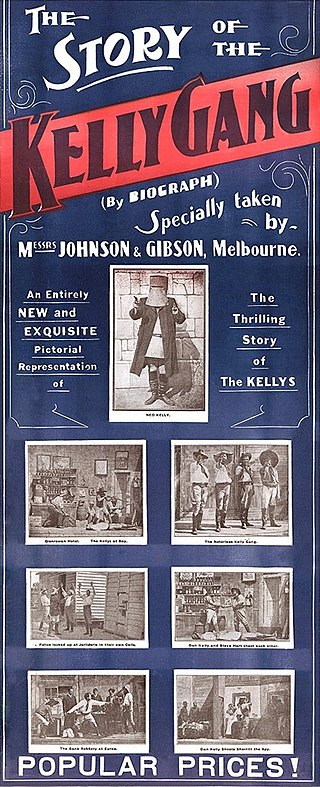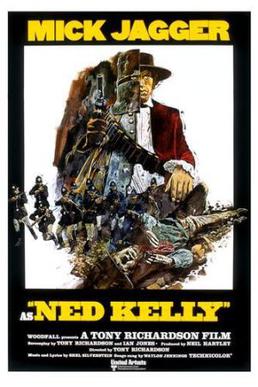Related Research Articles

Bushrangers were originally escaped convicts in the early years of the British settlement of Australia who used the bush as a refuge to hide from the authorities. By the 1820s, the term had evolved to refer to those who took up "robbery under arms" as a way of life, using the bush as their base.

The cinema of Australia had its beginnings with the 1906 production of The Story of the Kelly Gang, arguably the world's first feature film. Since then, Australian crews have produced many films, a number of which have received international recognition. Many actors and filmmakers with international reputations started their careers in Australian films, and many of these have established lucrative careers in larger film-producing centres such as the United States.

The Story of the Kelly Gang is a 1906 Australian Bushranger film directed by Charles Tait. It traces the exploits of 19th-century bushranger and outlaw Ned Kelly and his gang, with the film being shot in and around Melbourne. The original cut of this silent film ran for more than an hour with a reel length of about 1,200 metres (4,000 ft), making it the longest narrative film yet seen in the world. It premiered at Melbourne's Athenaeum Hall on 26 December 1906 and was first shown in the United Kingdom in January 1908. A commercial and critical success, it is regarded as the origin point of the bushranging drama, a genre that dominated the early years of Australian film production. Since its release, many other films have been made about the Kelly legend.
Timothy Burstall AM was an English Australian film director, writer and producer, best known for hit Australian movie Alvin Purple (1973) and its sequel Alvin Rides Again (1974).

Ned Kelly is a 1970 British-Australian biographical bushranger film. It was the seventh Australian feature film version of the story of 19th-century Australian bushranger Ned Kelly, and is notable for being the first Kelly film to be shot in colour.
Attack Force Z is a 1982 Australian-Taiwanese World War II film directed by Tim Burstall. It is loosely based on actual events and was filmed in Taiwan in 1979. It was screened at the Cannes Film Festival on 18 May 1981.

Alvin Purple is a 1973 Australian sex comedy film starring Graeme Blundell in the title role; the screenplay was written by Alan Hopgood and directed by Tim Burstall, through his production company Hexagon Productions and Village Roadshow.
The Longford Lyell Award is a lifetime achievement award presented by the Australian Academy of Cinema and Television Arts (AACTA), a non-profit organisation whose aim is "to identify, award, promote and celebrate Australia's greatest achievements in film and television." The award is presented at the annual AACTA Awards, which hand out accolades for technical achievements in feature film, television, documentaries and short films. From 1968 to 2010, the award was presented by the Australian Film Institute (AFI), the Academy's parent organisation, at the annual Australian Film Institute Awards. When the AFI launched the Academy in 2011, it changed the annual ceremony to the AACTA Awards, with the current award being a continuum of the AFI Raymond Longford Award.

The Last Confession of Alexander Pearce is a 2008 Australian-Irish film directed by Michael James Rowland starring Irish actors Adrian Dunbar as Philip Conolly and Ciarán McMenamin as bushranger Alexander Pearce and an ensemble Australian cast, including Dan Wyllie, Don Hany and Chris Haywood. The film was shot on location in Tasmania and Sydney between April and May 2008.

The Last of the Knucklemen is a 1979 Australian film directed by Tim Burstall.
Libido is a 1973 Australian drama film comprising 4 segments written and directed as independent stories, but screened together as one piece, exploring a common theme of instinctive desire and contemporary sexuality.
Petersen is a 1974 Australian drama film directed by Tim Burstall.
Stork is a 1971 Australian comedy film directed by Tim Burstall. Stork is based on the play The Coming of Stork by David Williamson. Bruce Spence and Jacki Weaver make their feature film debuts in Stork, being honoured at the 1972 Australian Film Institute Awards, where they shared the acting prize. Stork won the prize for best narrative feature and Tim Burstall won for best direction. Stork was one of the first ocker comedies. Stork was the first commercial success of the Australian cinema revival called the Australian New Wave.
Eliza Fraser is a 1976 Australian bawdy adventure drama film, directed by Tim Burstall and starring Susannah York, Trevor Howard, Noel Ferrier and John Castle. The screenplay was written by David Williamson.

The Australian Academy of Cinema and Television Arts (AACTA) is a professional organisation of film and television practitioners in Australia. The Academy's aim is "to identify, award, promote, and celebrate Australia's greatest achievements in film and television".

Australian Western, also known as meat pie Western or kangaroo Western, is a genre of Western-style films or TV series set in the Australian outback or "the bush". Films about bushrangers are included in this genre. Some films categorised as meat-pie or Australian Westerns also fulfil the criteria for other genres, such as drama, revisionist Western, crime or thriller. A sub-genre of the Australian Western, the Northern, has been coined by the makers of High Ground (2020), to describe a film set in the Northern Territory that accurately depicts historical events in a fictionalised form, that has aspects of a thriller.
Great Expectations: The Untold Story is a 1987 Australian film which was made as a feature film and a mini series.
The bushranger ban was a ban on films about bushrangers that came in effect in Australia in 1911–12. Films about bushrangers had been the most popular genre of local films ever since The Story of the Kelly Gang (1906). Governments were worried about the influence this would have on the population and bans against films depicting bushrangers were introduced in South Australia (1911), New South Wales and Victoria (1912).

Edward Irham Cole was an Australian theatrical entrepreneur and film director whose productions represented a synthesis of Wild West show and stage melodrama. He managed a theatre company, called the Bohemian Dramatic Company, that performed in semi-permanent and temporary tent theatres. During 1910 and 1911 Cole directed a number of silent films, adapted from his stage plays and using actors from his theatre company.
References
- ↑ Filmink Article reference to Tim Burstall "Tim Burstall's Bohemian Beginnings | Filmink Feature". Archived from the original on 9 February 2012. Retrieved 12 February 2012.